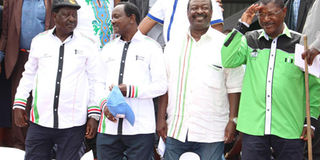Dictatorships cannot solve African leadership problems

From left: National Super Alliance co-principals Raila Odinga, Kalonzo Musyoka, Musalia Mudavadi and Moses Wetang’ula in Bomet on February 4, 2017. PHOTO
What you need to know:
- All well-meaning Kenyans, no matter their political or ethnic persuasion, should welcome a strong united opposition to face the Jubilee Party in this year's election, as a matter of principle.
- One need not like or support the opposition, but one needs to cherish the idea of dissent, checks and balances and the competition that a strong opposition provides.
The election season seems to bring some of the strangest ideas. It bothers me when supposed intellectuals suggest that Kenya and Africa need benevolent dictators to solve our problems. It bothers me because this thinking reflects a deep sense of inferiority for Africans.
Why shouldn’t we enjoy the freedoms that come with democracy? Is there something in our DNA that suggests we don’t deserve the right to expression to point out the ills and weaknesses of our leaders, and to dissent? How can we be certain that what may start out as a benevolent dictatorship won’t sink into corruption, repression and tribalism? And when it does turn from benevolence as it surely will, how can we ever change it peacefully?
The proponents of benevolent dictatorships are self-serving, and I am almost certain that they have a different opinion if the dictatorship, benevolent or not, is run by someone they do not favour.
The premise is that real democracy and credible elections are too messy, too unpredictable and too expensive, and the outcome uncertain. Perhaps: But better to have a good leader for a short time than a bad one for a long time.
Africa’s post-independence history forewarns the dangers of “benevolent” dictatorships. After independence, the leaders of most African countries decided that multiparty democracy was too expensive and too difficult to sustain in poor and uneducated societies.
ABOLISHED MULTI-PARTYISM
So they soon abolished multi-partyism, telling us that this was the fastest and surest way to get development and leapfrog our societies out of poverty, ignorance and disease. They did this either as civilian leaders – by either buying off or jailing the opposition – or through military coups.
The results were horrendous: we did not get the cherished progress and development. Instead, corruption, repression and tribalism thrived. And with no peaceful ways to change leaders, coups and attempted coups became the order of the day, together with a culture of silence and fear.
Kenya is typical of this idea of a “benevolent” dictatorship. Jomo Kenyatta took less than a year after independence to “convince” the opposition Kadu to disband and join Kanu. Kadu’s key leaders were amply rewarded, as we were told that this merger was about unity and development.
Then in 1969, the three year old opposition party KPU was banned after Mr Kenyatta was met with protests in Kisumu. This time KPU leaders were detained indefinitely without trial, and until Kenyatta’s death in 1978, no opposition was allowed to exist, as the regime embarked on a path of corruption, oppression and tribalism.
Daniel Moi went a few steps further, abolishing the legal possibility of having opposition parties, on the basis that the one party state was the pathway to development and unity. The impact was a repressive, corrupt and decadent state without development. It is not coincidental that the seed of what is now a huge diaspora started then.
STAND OUT
On the other end of the spectrum, it is instructive that Africa’s most successful economies are the ones that have persisted with democracy and dissent. Botswana, Mauritius and South Africa stand out in this regard.
This is why all well-meaning Kenyans, no matter their political or ethnic persuasion, should welcome a strong united opposition to face Jubilee in the next election, as a matter of principle. One need not like or support the opposition, but one needs to cherish the idea of dissent, checks and balances and the competition that a strong opposition provides. For nothing is better at making ruling regimes perform than the thought of losing credible elections.
But this can only work if the opposition understands that their unity and sense of purpose is better together than apart. So this means that the constant harping on who is the best as the flag bearer, and the public intrigues and manoeuvring need to stop. They need to get a formula that creates space for all of them, in a way that provides shared responsibilities, as well as checks and balances. It will matter less then who is eventually chosen as the flag bearer. If the Nasa leaders can’t do this, then they better disband now and we prepare ourselves for more corruption, looting and exclusion.





